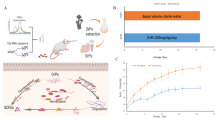Abstract
Trametes versicolor is a mushroom used as a traditional Chinese medicine (Yun-zhi) for a wide array of seemingly disparate conditions. We hypothesized that many of its multiple purported activities could be mediated through stimulation of beneficial mutualist components of the microbiota. Human fecal microbiota was cultured anaerobically to determine its ability to ferment a common extract of T. versicolor, designated polysaccharide peptide (PSP), and the ability of PSP to alter the composition of the microbial community. The presence of PSP and fructooligosaccharides (FOS, a common prebiotic) in the medium, but not cellulose, significantly increased levels of Bifidobacterium spp. PSP also elevated Lactobacillus spp., while reducing Clostridium spp., Staphylococcus spp. and Enterococcus spp. Levels of Streptococcus spp., Bacteroides spp. and Escherichia did not significantly change. Fermentation of PSP increased the concentration of organic acids (lactate and short-chain fatty acids), decreased the pH, and induced β-galactosidase and β-glucosidase activities. The genera of the human microbiota that are promoted by FOS and other prebiotics are also stimulated by the Trametes versicolor extract, PSP. Thus, Trametes versicolor, a common East Asian botanical, contains putative prebiotic agents that alter human gut microbiota and pH. This prebiotic-like activity may help explain some of the plethora of the health benefits attributed to this traditional Chinese medicine.


Similar content being viewed by others
References
Ng TB (1998) A review of research on the protein-bound polysaccharide (polysaccharopeptide, PSP) from the mushroom Coriolus versicolor (Basidiomycetes: Polyporaceae). Gen Pharmacol 30:1–4
Cui J, Chisti Y (2003) Polysaccharopeptides of Coriolus versicolor: physiological activity, uses, and production. Biotechnol Adv 21:109–122
Gibson GR, Probert HM, Loo JV et al (2004) Dietary modulation of the human colonic microbiota: updating the concept of prebiotics. Nutr Res Rev 17:259–275
Hughes SA, Shewry PR, Gibson GR et al (2008) In vitro fermentation of oat and barley derived beta-glucans by human faecal microbiota. FEMS Microbiol Ecol 64:482–493
Otieno DO, Shah NP (2007) Endogenous beta-glucosidase and beta-galactosidase activities from selected probiotic micro-organisms and their role in isoflavone biotransformation in soymilk. J Appl Microbiol 103:910–917
Hsu CA, Yu RC, Chou CC (2005) Production of beta-galactosidase by Bifidobacteria as influenced by various culture conditions. Int J Food Microbiol 104:197–206
Zhu WY, Williams BA, Konstantinov SR et al (2003) Analysis of 16S rDNA reveals bacterial shift during in vitro fermentation of fermentable carbohydrate using piglet faeces as inoculum. Anaerobe 9:175–180
Hsieh TC, Wu JM (2001) Cell growth and gene modulatory activities of Yunzhi (Windsor Wunxi) from mushroom Trametes versicolor in androgen-dependent and androgen-insensitive human prostate cancer cells. Int J Oncol 18:81–88
Standish LJ, Wenner CA, Sweet ES et al (2008) Trametes versicolor mushroom immune therapy in breast cancer. J Soc Integr Oncol 6:122–128
Torkelson CJ, Sweet E, Martzen MR et al (2012) Phase 1 clinical trial of Trametes versicolor in women with breast cancer. ISRN Oncol 2012:251632
Ramberg JE, Nelson ED, Sinnott RA (2010) Immunomodulatory dietary polysaccharides: a systematic review of the literature. Nutr J 9:54
Harada H, Sakagami H, Konno K et al (1988) Induction of antimicrobial activity by antitumor substances from pine cone extract of Pinus parviflora Sieb. et Zucc. Anticancer Res 8:581–587
Su WJ, Waechter MJ, Bourlioux P et al (1987) Role of volatile fatty acids in colonization resistance to Clostridium difficile in gnotobiotic mice. Infect Immun 55:1686–1691
Reddy BS (1998) Prevention of colon cancer by pre- and probiotics: evidence from laboratory studies. Br J Nutr 80:S219–S223
Rowland IR, Rumney CJ, Coutts JT et al (1998) Effect of Bifidobacterium longum and inulin on gut bacterial metabolism and carcinogen-induced aberrant crypt foci in rats. Carcinogenesis 19:281–285
Reddy BS (1999) Possible mechanisms by which pro- and prebiotics influence colon carcinogenesis and tumor growth. J Nutr 129:1478S–1482S
Roberfroid MB, Bornet F, Bouley C et al (1995) Colonic microflora: nutrition and health. Summary and conclusions of an International Life Sciences Institute (ILSI) [Europe] workshop held in Barcelona, Spain. Nutr Rev 53:127–130
Holzapfel WH, Haberer P, Snel J et al (1998) Overview of gut flora and probiotics. Int J Food Microbiol 41:85–101
Newburg DS, Ruiz-Palacios GM, Morrow AL (2005) Human milk glycans protect infants against enteric pathogens. Annu Rev Nutr 25:37–58
Rendón-Huerta J, Juárez-Flores B, Pinos-Rodríguez J, Aguirre-Rivera J, Delgado-Portales R (2012) Effects of different sources of fructans on body weight, blood metabolites and fecal bacteria in normal and obese non-diabetic and diabetic rats. Plant Foods Hum Nutr 67(1):64–70
Acknowledgments
We thank Winsor Health Products, Ltd. for their gift of PSP and partial support, Dr. Gherman Wiederschain for helpful assistance with the manuscript, and the NIH for grants HD013021, HD059140, and AI075563.
Conflict of interest
Dr. Zhuoteng Yu declares that she has no conflict of interest. Dr. Bo Liu declares that he has no conflict of interest. Dr. Purna Mukherjee declares that she has no conflict of interest. Dr. David S. Newburg declares that he has no conflict of interest.
Author information
Authors and Affiliations
Corresponding author
Rights and permissions
About this article
Cite this article
Yu, ZT., Liu, B., Mukherjee, P. et al. Trametes versicolor Extract Modifies Human Fecal Microbiota Composition In vitro . Plant Foods Hum Nutr 68, 107–112 (2013). https://doi.org/10.1007/s11130-013-0342-4
Published:
Issue Date:
DOI: https://doi.org/10.1007/s11130-013-0342-4




